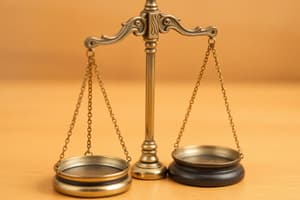Podcast
Questions and Answers
According to Rawls, society is a cooperative venture for mutual advantage, and he argues that the correct principles of justice are determined by:
According to Rawls, society is a cooperative venture for mutual advantage, and he argues that the correct principles of justice are determined by:
- The historical context of society
- The social hierarchy in place
- Whatever social contract people would agree to under idealized conditions (correct)
- The individual's social status
According to John Rawls's theory, which principle should be prioritized when distributing primary goods?
According to John Rawls's theory, which principle should be prioritized when distributing primary goods?
- The Principle of Efficiency
- The Principle of Maximizing Freedom
- The Principle of Maximizing Utility
- The Principle of Fair Equality of Opportunity (correct)
In Rawls's theory, what is the purpose of the veil of ignorance?
In Rawls's theory, what is the purpose of the veil of ignorance?
- To highlight the importance of historical context
- To promote self-interested social contracts
- To hide individuals' race, ethnicity, and wealth behind a veil (correct)
- To ensure everyone knows their social position
Which of the following is NOT considered a primary good in Rawls's theory?
Which of the following is NOT considered a primary good in Rawls's theory?
According to Libertarians, which of the following is considered the ONLY rights?
According to Libertarians, which of the following is considered the ONLY rights?
What information is hidden from individuals behind the veil of ignorance in Rawls's theory?
What information is hidden from individuals behind the veil of ignorance in Rawls's theory?
Rawls argues that the idealized 'fair' conditions where individuals are behind the veil of ignorance ensure that the social contract is:
Rawls argues that the idealized 'fair' conditions where individuals are behind the veil of ignorance ensure that the social contract is:
Which of the following principles is NOT included in the Libertarian tradition?
Which of the following principles is NOT included in the Libertarian tradition?
According to Rawls's theory, which of the following is considered a socio-economic right?
According to Rawls's theory, which of the following is considered a socio-economic right?
In Rawls's theory, the original position refers to the hypothetical situation where individuals are behind the veil of ignorance and:
In Rawls's theory, the original position refers to the hypothetical situation where individuals are behind the veil of ignorance and:
Which of the following principles is NOT included in Rawls's Social Contract?
Which of the following principles is NOT included in Rawls's Social Contract?
Which aspect does Rawls stress should be ignored behind the veil of ignorance when individuals are deciding on principles of justice?
Which aspect does Rawls stress should be ignored behind the veil of ignorance when individuals are deciding on principles of justice?
What is the core of John Rawls's theory?
What is the core of John Rawls's theory?
Which of the following is not a primary good in Rawls's theory?
Which of the following is not a primary good in Rawls's theory?
How are political rights and opportunities distributed according to Rawls's theory?
How are political rights and opportunities distributed according to Rawls's theory?
What condition justifies unequal distribution of socio-economic resources according to the difference principle?
What condition justifies unequal distribution of socio-economic resources according to the difference principle?
What does lexical priority mean in Rawls's theory?
What does lexical priority mean in Rawls's theory?
How does Rawls argue for his theory?
How does Rawls argue for his theory?
Flashcards
Rawls' Justice Theory
Rawls' Justice Theory
The principles of justice are those agreed upon in idealized conditions, behind a "veil of ignorance."
Veil of Ignorance
Veil of Ignorance
A hypothetical scenario where individuals choose principles of justice without knowing their personal characteristics or social status.
Political Equality (PE)
Political Equality (PE)
Equal access to rights and opportunities regardless of race, ethnicity, gender, age or income.
Substantial Equality of Opportunity (SEO)
Substantial Equality of Opportunity (SEO)
Signup and view all the flashcards
Difference Principle (Maximin)
Difference Principle (Maximin)
Signup and view all the flashcards
Lexical Priority
Lexical Priority
Signup and view all the flashcards
Social Contract (Rawls)
Social Contract (Rawls)
Signup and view all the flashcards
Consequentialism
Consequentialism
Signup and view all the flashcards
Welfarism
Welfarism
Signup and view all the flashcards
Libertarianism
Libertarianism
Signup and view all the flashcards
Principle of Just Acquisition
Principle of Just Acquisition
Signup and view all the flashcards
Principle of Just Transfer
Principle of Just Transfer
Signup and view all the flashcards
Principle of Just Rectification
Principle of Just Rectification
Signup and view all the flashcards
Study Notes
Rawls' Theory of Justice
- Rawls claims that the principles of justice are given by the social contract people would agree to under idealized conditions.
- In these conditions, everyone is behind a "veil of ignorance," where they don't know their:
- Race, ethnicity, gender, age, or income
- Wealth, natural endowments, or generation in society
- Behind the veil, people know:
- They have different life plans that require primary goods
- Society is under conditions of moderate scarcity
- General facts and common sense about human social life
- General conclusions of science, including economics and psychology
- The veil of ignorance ensures that citizens cannot choose a morally arbitrary or self-interested social contract.
Principles of Justice
- Rawls proposes three principles of justice:
- Principle 1: Political rights and opportunities are to be distributed equally, ensuring political equality (PE).
- Principle 2: Socio-economic rights and opportunities are to be distributed according to substantial equality of opportunity (SEO).
- Principle 3: Socio-economic resources are to be distributed according to the Difference Principle (Maxmin).
Lexical Priority
- The principles of justice have a lexical priority, meaning they are to be satisfied in a specific order:
- Political equality (PE)
- Substantial equality of opportunity (SEO)
- Maximin (Difference Principle)
Social Contract
- The social contract is an imaginary agreement between free and equal citizens under "fair" conditions.
- Rawls asks: what social contract would citizens agree to under these conditions?
Consequentialism and Welfarism
- Consequentialism: the state should enact policies that lead to the best outcome.
- Welfarism: the state should only consider the distribution of well-being.
Rights and Social Justice
- Libertarianism is the combination of seven claims, including:
- A policy is just if and only if it doesn't violate anyone's rights
- The only rights are property rights
- Principle of Just Acquisition
- Principle of Just Transfer
- Principle of Just Rectification
- No one is entitled to holding except by applications of the three principles
- The only sense in which an outcome can be said to be just is if the process that produced it is just
- Libertarians argue that taxation is unjust because it involves forced transfer of property without the owner's consent.
- However, libertarians allow for taxation to fund police to protect people's property rights.
John Rawls' Theory
- Rawls' theory is characterized by his three principles for distributing primary goods.
- Rawls argues that his theory is based on the principles of justice that people would agree to under idealized conditions.
Studying That Suits You
Use AI to generate personalized quizzes and flashcards to suit your learning preferences.




